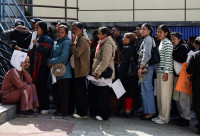National
Alliance plans to push TJ bill via vote if no consensus
Multiple attempts to build consensus have failed as ruling and opposition parties refuse to budge from their stands.
Post Report
The ruling alliance is preparing to amend the Enforced Disappearances Enquiry, Truth and Reconciliation Commission Act through a vote as months-long efforts at an all-party agreement failed to yield positive results.
The bill to amend the Act, registered in Parliament in March last year, is under consideration at the Law, Justice and Human Rights Committee of the House of Representatives. Multiple attempts to build consensus have failed as the ruling and main opposition CPN-UML have refused to budge from their positions.
“Years have passed since we started preparations to amend the Act but it hasn’t been possible for various reasons,” said Ramesh Lekhak, the Nepali Congress chief whip who is also a committee member. “We are still trying to build consensus with the main opposition. The amendment will be made in consensus but if that effort fails, due parliamentary process will be followed.”
Members of the House committee said a last-ditch effort is being made for consensus but signs are not encouraging. The government wants the bill to be endorsed from the House session that commenced last week. The ongoing session will continue for a maximum of two and a half months.
The parties have differences mainly on four points of the bill. The House panel is struggling to decide whether to categorise arbitrary killings or all killings except those that occurred during clashes as serious violations of human rights. It also has been unable to settle what happens in case the victims of human rights violations refuse to reconcile.
The parties also have differences in ways to address the concerns of those who were affected by the conflict even though they were not directly involved in it. Also, cross-party lawmakers have differences over reduced sentencing. Though there is an agreement that the penalty for the perpetrators who cooperate in the investigation can be reduced, they have yet to agree on the extent of such reduction.
Currently, the main opposition’s position largely aligns with the concerns of the conflict victims and human rights activists. Conflict victims have been saying extrajudicial killings, murder of unarmed individuals or all unlawful killings should be mentioned as serious human rights violations. They have demanded that serious mental and physical torture should also be listed as grave violations of human rights, thus non-amnestiable.
The victims say every case where there is no reconciliation should be prosecuted. The victims insist that the authority to reduce penalties should rest with the judiciary. It would be wrong to mention the penalty reduction in the Act itself.
The UML maintains that an amendment bill will be meaningless unless it is acceptable to the victims and the international communities and is in line with a 2015 Supreme Court ruling. The apex court had directed the authorities not to have amnesty provisions for serious violations of human rights and to categorise crimes as amnestiable and non-amnestiable. The ruling parties claim the existing bill is in line with the court’s verdict.
The parliamentary committee has agreed to give four years to the Commission of Investigation on Enforced Disappeared Persons and the Truth and Reconciliation Commission to investigate victims’ complaints and deliver justice. Looking at the volume of the cases, the conflict victims have demanded a provision for the possibility of term extensions for the commissions if they fail to complete their jobs in four years. They also have said six months should be allotted to register complaints for those who haven’t already done so.
Santosh Pariyar, the Rastriya Swatantra Party chief whip who is also a member of the House committee, said the law minister appears to be working to broker consensus on the four disputed issues. He said they are in informal discussions to find consensus which has so far been elusive.
"The government wants to pass the bill from the ongoing session through a vote, if not consensus," he said. "I also believe we have already spent a long time on a consensus bid. There shouldn’t be further delay in the name of consensus."
Other than the four issues, the parties have agreed to set up a special court to decide on the cases related to insurgency.
They have also agreed on a provision to allow an appeal in the Supreme Court if victims are dissatisfied with the special court’s decision, which is seen as a positive step.
As many as 63,718 complaints are under consideration at the truth commission while the disappearance commission has around 2,500 complaints to investigate.




 20.9°C Kathmandu
20.9°C Kathmandu













